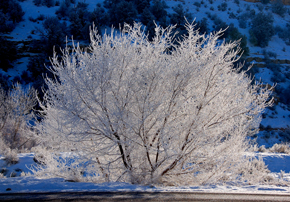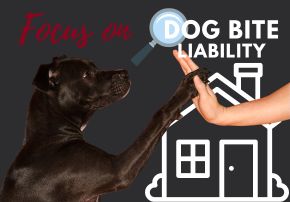SUNDAY, DECEMBER 15, 2024
 Winter Driving Basics Winter Driving Basics
Slow down. It's harder to control or stop your vehicle on a slick or snow-covered surface. Increase your following distance enough so that you will have plenty of time to stop for vehicles ahead of you. Don't crowd a snow plow or travel beside the truck. Snow plows travel slowly, make wide turns, stop often, overlap lanes and exit the road frequently. If you find yourself behind a snow plow, stay far enough behind it and use caution if you pass the plow. Even the best drivers may be no match for winter weather conditions. It’s a good idea to have your family members and employees brush up on their defensive driving techniques.
Stock Your Vehicle
Be prepared for winter weather and an emergency by keeping these items in your personal and work vehicle:
- Snow shovel,
- Broom and Ice Scraper
- Abrasive material (sand or kitty litter)
- Jumper cables,
- Flashlight and warning devices (flares or emergency markers)
- Cell phone and charger
- Water, food
- Blanket & Medicine.
If You Get Stuck
Follow these tips to stay safe if you are stopped on a road during winter weather: Stay with your vehicle and don't overexert yourself Put bright markers on the antenna or windows and keep the interior dome light on so your vehicle can be seen Make sure your exhaust pipe is clear of any snow and only run your vehicle sporadically -- just long enough to stay warm. Don't run your vehicle for long periods of time with the windows up or in an enclosed space.
Snow Removal Basics
Snow and ice accumulation on building roofs should be monitored.
Look for the following signs:
- Doors sticking
- New drywall cracks
- Creaking noises
- Bows in the roof structure
Posted 12:27 PM
TUESDAY, OCTOBER 1, 2024
With cooler weather upon us, you may want to make sure your home is sealed up tight and ready for winter. It’s much easier to tackle these tasks now, rather than wait to do them in the rain or snow.
1. Check your home for leaks in your window seals or roof. If your home’s eaves have stains, that can indicate a leak. If you find any stains, call a roof contractor to make any repairs before winter.
2. During the next rainstorm, check your gutters and ensure the water drains away from the home. If your area experiences snow, any back-up of gutters may result in ice damming and lead to water damage. Before winter arrives, shut off all outside water faucets or garden hose connections, then drain hoses and store them in the garage.
 3. Clean overgrown vegetation and trim dead branches from trees that are close to your home. Also give your lawn one last cut before cleaning and storing your lawn mower. 3. Clean overgrown vegetation and trim dead branches from trees that are close to your home. Also give your lawn one last cut before cleaning and storing your lawn mower.
4. Clean out your grill and firepit. Cover up or store any outdoor furniture, so it’s out of the elements and stays nice for next year.
5. If you have a HVAC service contract, have them stop by. Otherwise, replace filters and install covers on the AC condensing units on the outside of the home.
6. Call a professional to check your fireplace – especially if you plan to use it during the winter. Nothing is worse than smoking up your home when the weather is cold because your fireplace flue wasn’t cleaned. If you do use your fireplace, be sure to dispose of the ashes properly using a fireproof metal bucket.
7. Make sure everything you’ll need for winter is in good working order. If your area gets snow, test your snowblower and have it serviced. Ensure your outdoor activated night lights or security system components are all operating correctly.
- Originally posted by CHUBB https://www.chubb.com/us-en/individuals-families/resources/7-tasks-to-prepare-your-home-for-fall-weather.aspx?utm_source=prs_client&utm_medium=email&utm_campaign=pcc-october-fall-prepardness
Posted 7:18 PM
SUNDAY, SEPTEMBER 1, 2024
Avoid Hitting a Deer
 Fall is breeding season for deer so they will be more active near roads, especially around dawn and dusk. Fall is breeding season for deer so they will be more active near roads, especially around dawn and dusk.
Deer often travel in groups. If you see one along the road, you will likely encounter others.
Be extra careful near deer crossing signs.
Be Prepared for Changing Light
Sun Glare - The changing season brings the sun closer to the horizon, which keeps it pointed straight into your eyes and makes it more likely to reflect at low angles off other cars, buildings or windows.
The bright sun often creates a large amount of glare, making it difficult to see other vehicles, the road or the shoulder.
Always keep a pair of sunglasses in your vehicle and wear them during these times.
Shorter Days, Dark Commute - Make sure all of your vehicle's lights are working.
Don't look directly into the lights of oncoming traffic.
Keep your windshield clean so dirt doesn't add to the glare.
Give your eyes time to adjust to the dark, between two and five minutes, before hitting the road.
Fall Hazard: Leaves
 Slow down if you are driving on a road covered with leaves, especially when driving around turns. Slow down if you are driving on a road covered with leaves, especially when driving around turns.
Wet leaves can get extremely slippery, making the driving conditions similar to driving on ice.
Increase your following distance to allow yourself plenty of time to stop.
Be aware of visibility issues. Leaves make it difficult to see potholes, bumps in the road or road markings.
Never drive through a leaf pile. A pile of leaves raked to the side of the road is an inviting place to a child. Children enjoy jumping into the leaf piles or burrowing down into them and hiding. A leaf pile can also hide objects that can damage your car, such as a rake.
Keep your windshield leaf free. This will keep wet leaves from getting stuck under the windshield wiper blades.
Never park over a pile of leaves. Parking in a leaf pile creates a fire hazard from the exhaust system or catalytic converter.
Posted 3:25 PM
THURSDAY, AUGUST 1, 2024
 Are you stuck at home wondering what to do with all of your free time? Can You Name Every Item in Your Home? Are you stuck at home wondering what to do with all of your free time? Can You Name Every Item in Your Home?
Most people don't think about the many items they have collected over the years. Items are used every day, but often never thought about. Many items are replaced throughout the years, but no thought is given to the increased value of inventory. Creating and maintaining an inventory of items in your home can help ensure you have purchased the right insurance coverage. In the event of a loss, it can help you settle a claim faster, and put less strain on your brain in an already stressful situation.
How do You Create Your Home Inventory?
Creating and maintaining your home inventory is easy with available software. Now you can download apps right on your phone to create, maintain, and update your inventory. Having online storage will allow you to access your inventory anywhere, any time. You never know when a claim may happen, but you can be prepared with an up-to-date online home inventory.
What Should You Include in Your Home Inventory?
You should take inventory of everything of value in your home, and update the list as you acquire new items. Here is a list of some of the most common items:
-
Electronics (TV, Gaming Console, Computer)
- Kitchen and Household Appliances (Washer/Dryer, Microwave, Oven, Refrigerator)
- Furniture
- Clothing
- Jewelry
- China
- Silverware
- Artwork
- Antiques
- Linens
- Books
- Guns
- Sporting Equipment
Some items like jewelry, antiques, and other special items, may need to be insured separately. Talk to one of the specially trained independent agents at Rutt Insurance to make sure you have the coverage that you need.
SATURDAY, JUNE 1, 2024
 Spotlight on: Dog Bite Liability Spotlight on: Dog Bite Liability
SOURCE: Insurance Information Institute. View original article at iii.org
Overview
About 65 million U.S. households own dogs, according to the American Pet Products Association’s 2023-2024 Pet Owners Survey. The American Veterinary Medical Association states there are nearly 90 million dogs living in U.S. households. About 4.5 million people are bitten by dogs each year, most of them children.
Homeowners and renters insurance policies typically cover dog bite liability legal expenses, up to the liability limits (typically $100,000 to $300,000). If the claim exceeds the limit, the dog owner is responsible for all damages above that amount.
Dog bite liability and homeowners insurance
Some insurance companies will not insure homeowners who own certain breeds of dogs categorized as dangerous, such as pit bulls. Others decide on a case-by-case basis, depending on whether an individual dog, regardless of its breed has been deemed vicious. Some insurers do not ask the breed of a dog owned when writing or renewing homeowners insurance and do not track the breed of dogs involved in dog bite incidents. However, once a dog has bitten someone, it poses an increased risk. In that instance, the insurance company may charge a higher premium, nonrenew the homeowner’s insurance policy or exclude the dog from coverage.
Some insurers are taking steps to limit their exposure to such losses. Some companies require dog owners to sign liability waivers for dog bites, while others charge more for owners of breeds such as pit bulls and Rottweilers and others are not offering insurance to dog owners at all. Some will cover a pet if the owner takes the dog to classes aimed at modifying its behavior or if the dog is restrained with a muzzle, chain or cage.
Homeowners insurance liability claims
· Liability claims related to dog bites and other dog-related injuries cost homeowners insurers $1,116 million in in 2023, according to the Insurance Information Institute (Triple-I) and State Farm®.
· The number of dog bite claims nationwide increased in 2023 to 19,062 from 17,597 in 2022—a 8.3 percent increase, according to an analysis of homeowners insurance claims data by the Triple-I.
· The average cost per claim decreased 9.3 percent in 2023 to $58,545 from $64,555 in 2022. The average cost per claim nationally has risen 82.5 percent from 2014 to 2023, due to increased medical costs as well as the size of settlements, judgments and jury awards given to plaintiffs, which are trending upwards.
· By state, California continues to have the largest number of claims in the United States, at 2,104 in 2023, up from 1,954 in 2022. The state with the second highest number of claims was Florida with 1,532. Illinois had the highest average cost per claim at $73,797, followed by Wyoming with an average cost of $73,324.
State and local legislation
In 29 states, dog owners are liable for injuries their pets cause, with some exceptions such as if the dog was provoked, according to a Triple-I analysis of dog bite laws compiled by the American Property Casualty Insurers Association as of March 2021. In 17 states and the District of Columbia, liability is not automatically granted but attacks are classified as misdemeanors or, in extreme cases, as felonies, with fines. There are no laws for dog bites in four states—Arkansas, Kansas, Mississippi and North Dakota. With regard to insurance, at least two states, Pennsylvania and Michigan, have laws that prohibit insurers from canceling or denying coverage to the owners of particular dog breeds in some policies. Some states could exclude coverage after a dog bite, such as Ohio, which also requires owners of dogs that have been classified as vicious to purchase at least $100,000 of liability insurance. This white paper was presented to the National Association of Insurance Commissioners (NAIC) by animal rights groups in November 2020. It discusses what they see as the discriminatory impact of the insurance industry’s use of dog breed lists to deny homeowner and renters insurance policy sales, to issue policy non-renewals, and to place limitations on coverage.
According to the American Veterinary Medical Association, several states statutorily prohibit breed specific local ordinances.
Despite the COVID-19 pandemic keeping more people at home in 2020 and an increase in home deliveries, the number of dog bite claims in the United States dropped by 4.6 percent from 2019. Additionally, a February 2021 survey from the Insurance Research Council, Consumer Responses to the Pandemic and Implications for Insurance, found that 21 percent of homeowners reported adopting a dog in 2020.
· Dog owners’ liability: There are three kinds of law that impose liability on owners:
1) A dog-bite statute: where the dog owner is automatically liable for any injury or property damage the dog causes without provocation.
2) The one-bite rule: where the dog owner is responsible for an injury caused by a dog if the owner knew the dog was likely to cause that type of injury—in this case, the victim must prove the owner knew the dog was dangerous.
3) Negligence laws: where the dog owner is liable if the injury occurred because the dog owner was unreasonably careless (negligent) in controlling the dog.
· Criminal penalties: Dog owners could be charged with serious crimes if their dogs attack and severely injure people. In a 2002 California case, a woman and her husband were tried for second-degree murder after their Presa Canario dogs attacked and killed a neighbor. The woman was convicted of second-degree murder and her husband was convicted of involuntary manslaughter. This was only the third time that dog owners were tried for murder in the U.S. The first case was in Kansas in 1997.
Charts
Estimated Number and Cost of Dog Bite Claims, 2014-2023 (1)
|
Year
|
Value of claims
($ millions)
|
Number
of claims
|
Average cost
per claim (2)
|
|
2014
|
$530.8
|
16,550
|
$32,072
|
|
2015
|
571.3
|
15,352
|
37,214
|
|
2016
|
602.2
|
18,123
|
33,230
|
|
2017
|
686.3
|
18,522
|
37,051
|
|
2018
|
674.9
|
17,297
|
39,017
|
|
2019
|
796.8
|
17,802
|
44,760
|
|
2020
|
853.7
|
17,597
|
50,245
|
|
2021
|
881.9
|
17,989
|
49,025
|
|
2022
|
1,136.0
|
17,597
|
64,555
|
|
2023
|
1,116.0
|
19,062
|
58,545
|
|
Percent change, 2022-2023
|
-1.8%
|
8.3%
|
-9.3%
|
|
Percent change, 2014-2023
|
110.2%
|
15.2%
|
82.5%
|
|
(1) Includes other dog-related injuries that have impacted claims such as fractures or other blunt force trauma injuries.
(2) Calculated from unrounded data.
Source: Insurance Information Institute, State Farm®.
Top 10 States By Estimated Number and Cost of Dog Bite Claims, 2023 (1)
|
Rank
|
State
|
Number of claims
|
Average cost
per claim (2)
|
Value of claims
($ millions)
|
|
1
|
California
|
2,104
|
$68,125
|
$143.3
|
|
2
|
Florida
|
1,532
|
66,615
|
102.1
|
|
3
|
Texas
|
1,040
|
59,925
|
62.3
|
|
4
|
Michigan
|
932
|
69,168
|
64.5
|
|
5
|
Ohio
|
885
|
39,119
|
34.6
|
|
6
|
Pennsylvania
|
857
|
53,914
|
46.2
|
|
7
|
New York
|
851
|
66,578
|
56.7
|
|
8
|
Illinois
|
837
|
73,797
|
61.8
|
|
9
|
New Jersey
|
649
|
62,295
|
40.4
|
|
10
|
Georgia
|
495
|
57,572
|
28.5
|
|
|
Top 10
|
10,182
|
$62,891
|
$640.4
|
|
|
Other
|
8,880
|
$53,561
|
$475.6
|
|
|
Total United States
|
19,062
|
$58,545
|
$1,116.0
|
|
(1) Includes other dog-related injuries that have impacted claims such as fractures or other blunt force trauma injuries.
(2) Calculated from unrounded data.
Source: Insurance Information Institute, State Farm®.
Number of U.S. Households That Own a Pet, by Type of Animal
(millions)
|
Pet
|
Number
|
|
Dog
|
65.1
|
|
Cat
|
46.5
|
|
Freshwater fish
|
11.1
|
|
Small animal
|
6.7
|
|
Bird
|
6.1
|
|
Reptile
|
6.0
|
|
Horse
|
2.2
|
|
Saltwater fish
|
2.2
|
|
Source: American Pet Products Association's 2023-2024 National Pet Owners Survey.
Posted 12:19 PM
|
Blog Archive
2026
2025
2024
2023
2022
2020
2019
2018
2017
2016
|